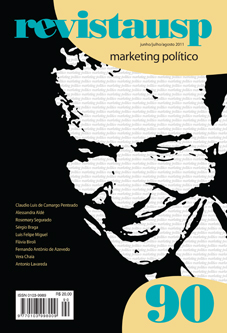NEUROPOLÍTICA: THE ROLE OF EMOTIONS AND THE UNCONSCIOUS
DOI:
https://doi.org/10.11606/issn.2316-9036.v0i90p120-147Keywords:
neuropolitics, emotions, electoral behavior.Abstract
This article first presents a summary of the evolution of the approach to emotions and the unconscious in psychology and recent studies of neuroscience, and thus it shows where those topics belong within the main theories of the 20th century which sought to explain the political behavior with an emphasis on voting behavior. Then it presents four analytical approaches of the field that can be named neuropolitics: politics viewed as a moral dispute; a model of emotional intelligence; the evaluation of emotional strategies of the campaigns; and the direct measurement of the emotional and unconscious responses to political stimuli. In its last part, the article presents a summary of the preliminary results of a pioneering study of experimental nature in Brazil, meant to evaluate the psycho-neuro-physiological responses of a group of voters from the C class confronted with images of presidential candidates in the 2010 election, by making use of electroencephalography and eye-tracker.
Downloads
References
ALBUQUERQUE, Ana Cristina Taunay Cavalcanti. O Fenômeno Muitas Faces: Estudo Comparando a Percepção do Fenômeno Quando Utilizamos Estímulos de Face e Cadeira. Dissertação de mestrado em Neuropsiquiatria e Ciências do Comportamento. Recife, Universidade Federal de Pernambuco, 2007.
ARNOLD, M. B. Emotion and Personality. Nova York, Columbia University Press, 1960.
BERELSON, Bernard R.; LAZARSFELD, Paul F.; Mcphee, William N. Voting: a Study of Opinion Formation in a Presidential Campaign. Chicago, The University of Chicago Press, 1954.
BEYERSTEIN, Barry. “Mitos Relacionados às Estruturas e Funções Cerebrais”, in Revista Viver Mente & Cérebro Scientific American. Ed. Especial no 19, pp. 65-71, 2009.
BRADER, Ted. Campainging for Hearts and Minds: How Emotional Appeals in Political Ads Work. Chicago, The University of Chicago Press, 2006.
CANNON, Walter B. Bodily Changes in Pain, Hunger, Fear and Rage. New York, D. Appleton & Co., 1920.
CBS/NYTIMES. “Poll: National Survey of Tea Party Supporters”, in New York Times, 12 de abril de 2010.
CONVERSE, P. E. “The Nature of Belief Systems in Mass Publics”, in D. E. Apter (ed.). Ideology and Discontent. Glencoe, Free Press, 1964, pp. 206-61.
DAMÁSIO, Antonio. Em Busca de Espinosa. São Paulo, Companhia das Letras, 2004.
_______. O Mistério da Consciência. São Paulo, Companhia das Letras, 2000.
DOBBS, David. “Limites da Imagem”, in Revista Viver Mente & Cérebro Scientific American, Ed. Especial no 19, 2009, pp. 65-71.
DOWNS, Antonhy. An Economic Theory of Democracy. Nova York, Harper and Row, 1957.
ELLIS, Albert. Reason and Emotion in Psychotherapy. Oxford, Lyle Stuart, 1962.
FIORINA, Morris. Retrospective Voting in American National Elections. New Haven, Yale University Press, 1981.
GREEN, A. “O Duplo e o Ausente”, in A. Green. O Desligamento. Rio de Janeiro, Imago, 1994.
GUÉGUEN, Nicolas. Psychologie du Consommateur. Paris, Dunod, 2011.
JAMES, William. “What is an Emotion?”, in Mind, vol. 9, 1884, p.188-205.
KELNER, Gilda. “O Amor na Clínica Psicanalítica”. Trabalho apresentado em mesa-redonda, ao III Congresso de Psicopatologia Fundamental. São Paulo, 24 a 26 de abril de 1998.
KEY, V. O. Responsible Electorate. Cambridge, Havard University Press, 1966.
LAKOFF, George. The Political Mind. Nova York, Penguin Books, 2009.
LAU, Richard R.; REDLAWSK, David P. “Voting Correctly”, in American Political Science Review 91, September/1997.
LAVAREDA, Antonio. Emoções Ocultas e Estratégias Eleitorais. Rio de Janeiro, Objetiva, 2009.
LAZARSFELD, Paul F.; BERELSON, Bernard; GAUDET, Hazel. The People’s Choice. Nova York, Duell/Sloan and Pearce, 1944.
LAZARUS, Richard S.; LAZARUS, Bernice N. Passion & Reason: Making Sense of Our Emotions. Nova York, Oxford University Press, 1994.
LEDOUX, Joseph. The Emotional Brain. Nova York, Simon & Schuster, 1996.
LINDSTROM, Martin. Buy-ology: Truth and Lies About Why We Buy. Nova York, Doubleday Publishing Group, 2008.
MARCUS, George E.; NEUMAN, Russel W.; MACKUEN, Michael. Affective Intelligence and Political Judgement. Chicago, The University of Chicago Press, 2000.
MENDONÇA, Duda. Casos & Coisas. São Paulo, Globo, 2001.
MITHEN, Steven. A Pré-história da Mente. São Paulo, Unesp, 2003.
NEUMAN, Russell W. et al. “Theorizing Affect’s Effects”, in Russell Neuman et al. (eds.). The Affect Effect: Dynamics of Emotion in Political Thinking and Behavior. Chicago, The University of Chicago Press, 2007.
POPKIN, Samuel L. The Reasoning Voter: Communication and Persuasion in Presidential Campaigns. 2a ed. Chicago, The University of Chicago Press, 1994.
PRADEEP, A. K. The Buying Brain: Secrets for Selling to the Subconscious Mind. Nova York, Hadcover, 2010.
ROSEMAN, I. “Cognitive Determinants of Emotions: a Structural Theory”, in Review of Personality and Social Psychology. Beverly Hills, Sage, 1984.
STEVE, Johnson. De Cabeça Aberta: Conhecendo o Cérebro para Entender a Personalidade Humana. Rio de Janeiro, J. Zahar, 2004.
WESTEN, Drew. O Cérebro Político. São Paulo, Unianchieta, 2007.
WINKIELMAN, P.; BERRIDGE, K. “Irrational Wanting and Subrational Liking: How Rudimentary Motivational and Affective Processes Shape Preferences and Choices”, in Political Psychology, n. 24, 2003.
ZAJONC, Robert. “Feeling and Thinking: Preferences Need no Inferences”, in American Psychologist 36, 1980, pp. 151-75.
Downloads
Published
Issue
Section
License
Copyright (c) 2023 Revista USP

This work is licensed under a Creative Commons Attribution-NonCommercial-ShareAlike 4.0 International License.
|
Pertence à revista. Uma vez publicado o artigo, os direitos passam a ser da revista, sendo proibida a reprodução e a inclusão de trechos sem a permissão do editor. |


